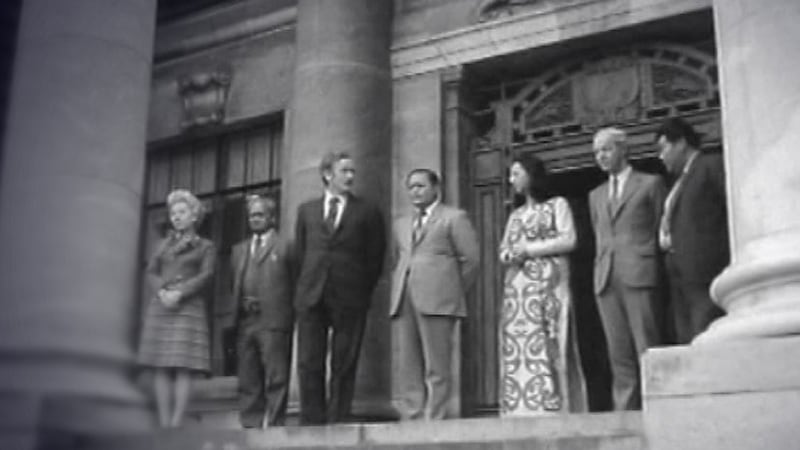Fifty years after helping to deliver the petition demanding the country's politicians recognise te reo Māori Dr Robert Pouwhare says the language was in dire straits, but is now in a much healthier position.
"Kāore au i te kī kei te ora tonu, kei te tika te ora engari kei te tino kaha, kei te tino pakari i tēnei wā."
(I'm not saying it's perfect, but it is getting stronger, it is getting better.)
He is excited that the reo is flourishing, especially in mainstream settings 50 years later.
"Kei te kōrerotia te reo, kei te waiatahia te reo, kei te pāpahohia te reo. Kua nui ngā ao kua uru te reo ki roto, kua kitea mai he painga kei roto i tō tātou reo mō te ao katoa.
"Kei te whakaahohia ngā reo me ngā tikanga ki ngā marautanga o te kura tikanga ki konei ki Tāmaki, kei te uru ki te ao hokohoko. Kei te kī hoki etahi kamupene arā noa atu ngā painga ki te whiwhi i tētahi paku āhuatanga Māori ina ka haere ki tāwāhi."
(Our language is being spoken, it's being sung, its being broadcast. There are many parts of our world where our voices are being heard, and where our language is being valued. Our language is also being included in the curriculum at the law school here in Auckland. It's being included in trade talks. Companies are also recognising the unique value our reo has for them when looking overseas.)
50 years on, te reo Māori continues to thrive.
In 1972, Pouwhare says it was a tumultuous time in Aotearoa with non-Māori not paying any attention, or any care towards te ao Māori let alone te reo Māori. And research by a Pākehā linguist, Richard Benton raised the alarm about the rapid loss of the native language of Aotearoa.
"Ngā kitenga o taua rangahau i ohorere katoa mātou nā te mēa e whakaatu mai ana e mimiti haere ana te hunga e matatau ana ki te reo, e iti haere ana nā te mea e mate haere ana ngā kaumātua, kua mene ki te pō, kua ngaro atu te reo i a rātou."
(That research really shocked us, it showed that the number of speakers of te reo Māori was really getting small fast, and the language was fading away with the many elders of the time who were dying.)
But groups such as Ngā Tamatoa in Auckland and Te Reo Māori Society in Wellington leaped into action, launching an audacious, and sometimes dangerous mission to gather signatures calling for parliament to include te reo Māori in the school curriculum to stop te reo Māori from becoming extinct.
On the 14th of September, 1972, more than 30,000 signatures later the Māori language petition was delivered to parliament. The late Hana Te Hemara presented the petition to politicians, while many Māori who would later become prominent in Aotearoa were also involved, including actor Rawiri Paratene, educationalist Dr Cathy Dewes, business leader Whaimutu Dewes, activist and artist Tame Iti. But Pouwhare also says many Pākehā allies played a crucial support role in securing the future of te reo Māori.
"Huihui ai mātou i te whare tēnehi i Te Whare Wānanga o Wikitōria. I haramai rātou ki te whakaharatau i tō rātou reo, me mātou hoki ki te whakaharatau i ngā waiata, i ngā mōteatea. I haere mai hoki ngā kaumātua ki ngā huihuinga o te rōpū o te reo."
"Engari i kī mai rātou nā te mea he kaupapa Māori, me noho taina rātou kia mātou ngā Māori. Mā ngā Māori hei whakahaere, hei whakaaro i ngā rautaki hei whakaora i te reo."
(We would meet at the tennis club at Victoria University where they would learn te reo, and we would practice waiata. Our kaumātua would also come along to our Society hui. But at the end of the day those Pākehā friends would say to us because the survival of the language was a kaupapa Māori it was best if they stayed in the background and let Māori lead and they played a support role.)


